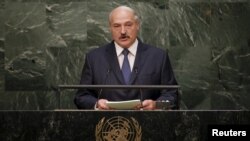President Alexander Lukashenko, in power for 21 years, is virtually certain to win a fifth term in office on Sunday in an election observers say is unlikely to see the kind of violent mass protests that marred the 2010 poll.
The West has long ostracized Lukashenko, a feisty, heavily built former state farm manager, over his human rights record and his clampdown on political dissent and has imposed economic sanctions on some Belarussian officials and companies.
But Lukashenko's criticism of Russia's annexation of Ukraine's Crimea peninsula last year, his hosting of Ukraine peace talks and his pardoning of six opposition leaders in August have led to a cautious rapprochement with the European Union and the United States.
"The West is interested in Belarus's stability. It wants peaceful elections that can be seen as bringing progress in terms of democracy and human rights," said Yury Tsarik of the Belarussian Center for Strategic and Political Research.
Echoing that comment, the head of Belarus's Center for European Transformation, Andrei Yegorov, said: "The Belarussian authorities don't have to do much [for Sunday's elections] ... They need to keep up appearances."
A sense of apathy among ordinary Belarussians, combined with a strong desire for stability in the face of a more assertive Russia and a crisis-plagued Ukraine, mean few observers expect large-scale protests as in 2010, when Lukashenko had his main opponents jailed.
Belarussian author Svetlana Alexievich, who on Thursday won this year's Nobel Prize for literature, summed up the mood of resignation among opponents of a man who came to power in 1994 and shows no sign of wanting to retire.
"I will not vote in these elections because we know who will win," said Alexievich, who now lives in Minsk after spending many years in western Europe.
A former opposition presidential candidate, Nikolai Statkevich, has called for pre-election protests, but turnout at similar events in recent months has been in the low hundreds.
Economic Crisis
While Russia retains significant influence in Belarus, not least as one its main lenders, Lukashenko has on occasion been at pains to show his independence. Most recently he denounced Russian plans to build a military base in Belarus, appearing to make a rare concession to public opposition.
The European Union is an important trade partner for Belarus and the release of the six prisoners in August prompted some in Brussels to argue for the future lifting of trade barriers.
A larger export market would be welcome to Belarus, whose economy has been battered this year by the slump in Russia's ruble currency.
Belarus' gross domestic product shrank by 3.5 percent in the January-August period and the average monthly wage has fallen by about a third in dollar terms since the start of the year to $420.
Nevertheless, support for Lukashenko, who described himself in an interview with Reuters three years ago as the "last and only dictator in Europe", has risen to 47 percent, according to a September survey by the independent Institute for Socio-economic and Political Studies.
Lukashenko, 61, keeps tight control of his country's mass media and none of the three candidates running against him in Sunday's poll represent a serious challenge to his rule.
"The economic crisis should logically have led to a fall in trust, but this was neutralised by the Ukraine crisis, which seriously scared Belarussian society," said Valery Karbalevich, who has written a biography of the president. "Lukashenko cast himself as the guarantor of peace and security ... and this image worked."





